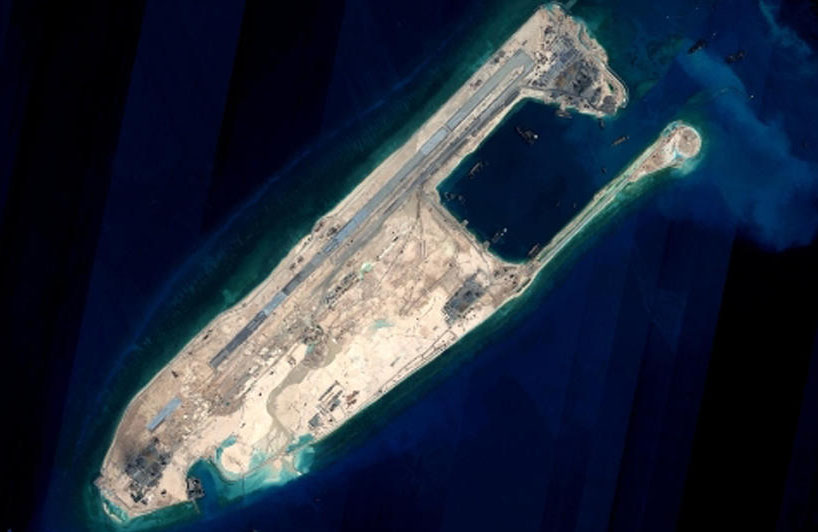Lately the tension concerning the South China Sea is rising higher. Given China’s land reclamation, there is increasing suspicion about China’s strategic intention in this region. As China has conducted massive land reclamation in the South China Sea in a short period of time, China could theoretically build a defense installation there, making its access to the entire area much easier.

DigitalGlobe imagery of the nearly completed construction within the Fiery Cross Reef located in the South China Sea. Fiery Cross is located in the western part of the Spratly Islands group.
Subsequently, the US has indicated its concern that China’s move that might possibly hamper the international norm of freedom of navigation. The US is both upset by China’s fast and massive land reclamation there, and more concerned about the likelihood that China would consequently perceive its possession of new territory to associated and valuable territorial water and space.
America wants to make sure that artificial islands, based on previous status as low-tide elevation, shall not be entitled to sovereign water and associated space. This may be applicable to Subi Reef, Mischief Reef and Cuarteron Reef etc. Therefore, the Pentagon has dispatched the USS Lassen to within 12 nautical miles of Subi Reef, as a part of its exercise of “Freedom of Navigation”. If the US truly doesn’t accord recognition of territorial water of these reefs, its ship may enter such close water without citing a right of “innocent passage”. According to American press reports, a US strategic bomber B52 has even reached as close as 2nm of the Cuarteron Reef, claiming afterward to have been “drifting off course” due to bad weather, possibly to test China’s response.
While the US may have its reason for suspicion and testing Chinese response, China has its own logic of distrusting America. China’s arguments could be summarized as the following. First, China has claimed all rock features within U-shaped lines since 1947 and has for decades met no opposition from either those South China Sea-ringing states or other major powers including the US. Second, dozens of these islands and islets of the Spratly have later been occupied by some ASEAN members but China is still willing to “shelve difference and co-develop (the region)”. Third, though those other claimants have already reclaimed a number of the islands and islets under their occupation and militarized them, they have not been blamed at all. Therefore, China feels puzzled about why it is singled out for reclaiming some of its own rock features?
One could offer a possible interpretation. As China is a rising power, its land reclamation could change the geostrategic balance of power in the region in China’s favor, while other claimants could not. No matter how Vietnam and the Philippines use their claims, they have neither the intent nor capacity to affect sea lanes of communication or to change the regional balance of power. But given China’s magnitude, it could as long as it would be willing to do so.
This could be a big misunderstanding of China. China is merely doing the same as other ASEAN states are doing. China is understood to have committed not to conducting more reclamation, and not to be militarizing these artificial structures. These are serious commitment made at high level. China’s intent is to use these expanded structures to offer international civil goods such as beacons and weather forecasting. Understandably China would improve its defense facilities there in certain limited ways for legitimate interests.
As the US cites “international code” to conduct close-in reconnaissance missions in the air and at sea toward these low-tide elevations, it significantly increases the risks of misunderstanding between the two armed forces. Even though the US may deem such reefs don’t qualify as territorial water and associated space, China is still entitled to the sovereignty of the rocks, and the US reckless overflights and sailing increases the chance of miscalculation and conflict. Though China has committed not to militarize these reefs, the US excessive exercise of freedom of navigation could be rather unhelpful. By threatening China unnecessarily, the US could provoke China to build up defense over these rocks.
Mutual suspicion between China and the US should be dissolved through dialogue and transparency. It would be desirable if China could brief America of Beijing’s reclamation moves beforehand in the future. It would also be constructive if the US would abandon its approach of microphone diplomacy. Washington should rethink whether it makes sense to send naval vessels again to close-in waters of those reclaimed reefs. Both parties must strive not to repeat accidents like the air collision on April Fool’s Day of 2001.

